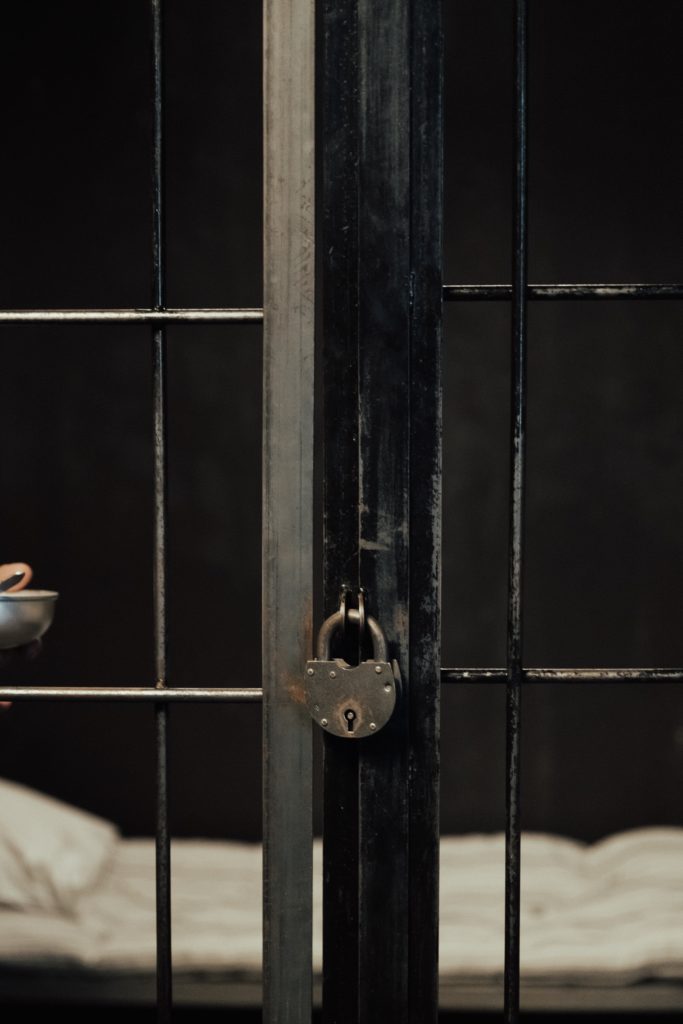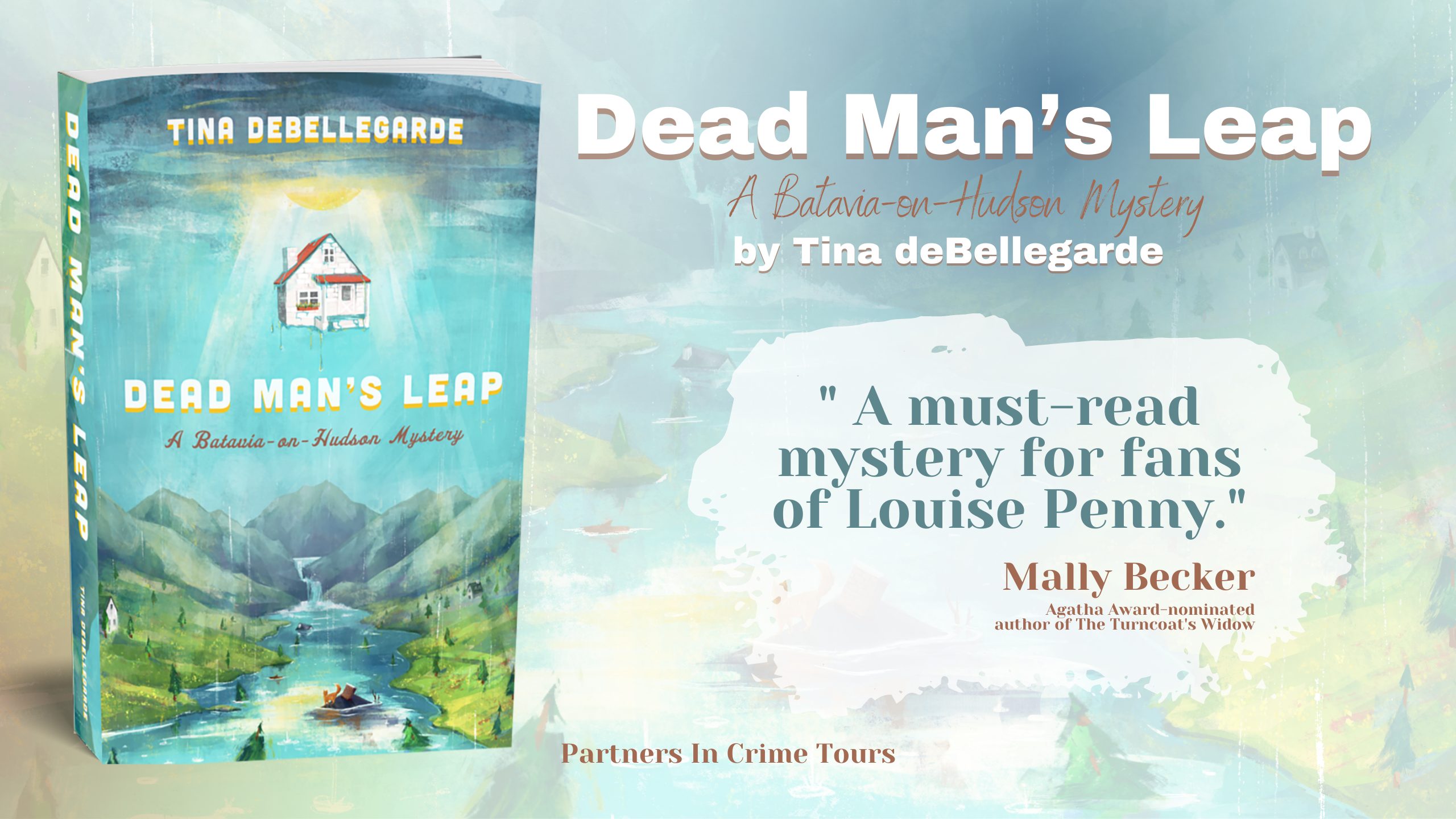Lawn Darts and Lemonade
May 29th, 2022From New England’s Storyteller, Steven Manchester, comes the nostalgia-filled sequel to Bread Bags & Bullies; a novel about growing up in a whacky family during the 1980s. Boom boxes, leg warmers and Rubik’s Cubes—it’s all there. A hysterical walk down memory lane!
“Steven Manchester’s Lawn Darts & Lemonade is so much fun, filled with laughter, tears, and Big Hair.” – Taylor Dayne, ’80s Recording Artist, Love Will Lead You Back
It’s the summer of 1984, a season of dodging lawn darts and chugging lemonade—or at least the discolored tap water Ma tried to disguise as lemonade.
Growing up is never easy, no matter what era you do it in. For generations, teenagers have suffered peer pressure, bullying, fear of rejection, and a sadistic obstacle course of one unexpected challenge after the next. Three brothers, Wally, Herbie, and Cockroach, learn that the past can be filled with questions—even shame and regret—while the future might be shrouded in worry and fear. But staying in the moment, now that’s where the sweet spot is.
ISLAND BREEZES
This book begins with an older Wally, Herbie and Cockroach sitting around the table reminiscing. Those are the boys from Bread Bags and Bullies.
Then we go back to the summer of 1984 when they were boys.
Oh, the memories evoked by the antics of these kids. Unless you’re from a much, much younger generation you’ll remember at least some of these games and toys.
If you can’t remember any of them, I feel sorry for you. That means you missed out on a wonderful time of growing up. They are from a time when our country was a freer place in which to grow up.
This book is a stand alone read, but you’ll enjoy it even more if you read Bread Bags and Bullies first.
As always, I’ve never read a book by Steven Manchester that I haven’t thoroughly enjoyed. Thank you, Mr. Manchester, for sharing your stories with us.
***Book provided without charge by the author.***
Humble Prayer
May 28th, 2022Death Warrant
May 24th, 2022Death Warrant
by Bryan Johnston
June 1-30, 2022 Virtual Book Tour
Synopsis:
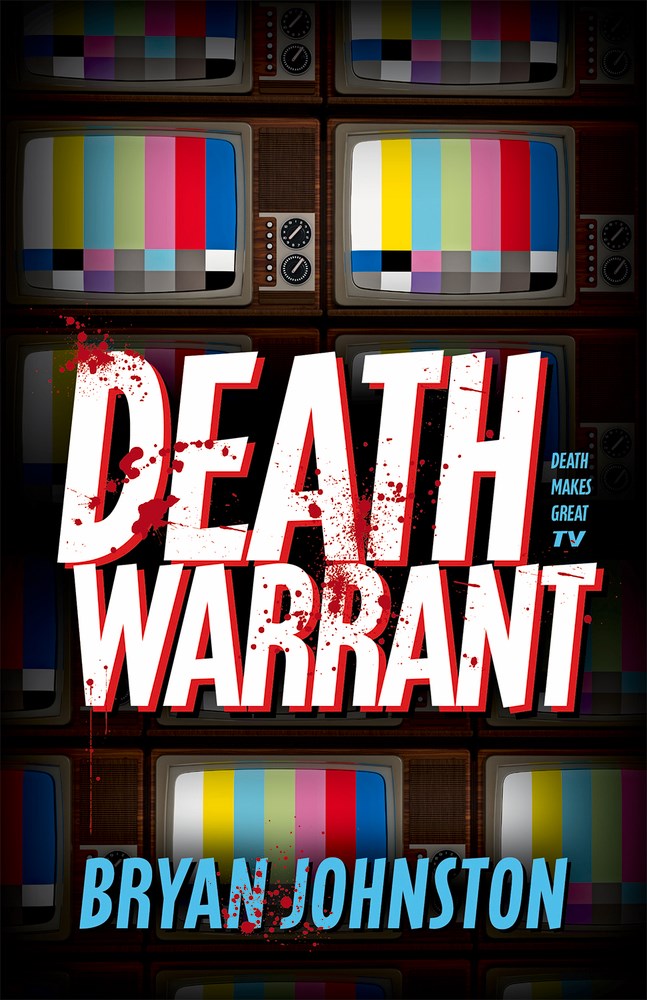
Death Makes Great TV.
Frankie Percival is cashing in her chips. To save her brother from financial ruin, Frankie?a single stage performer and mentalist who never made it big?agrees to be assassinated on the most popular television show on the planet: Death Warrant. Once she signs her life away, her memory is wiped clean of the agreement, leaving her with no idea she will soon be killed spectacularly for global entertainment.
After years of working in low-rent theaters, Frankie prepares for the biggest performance of her life as her Death Warrant assassin closes in on her. Every person she encounters could be her killer. Every day could be her last.
She could be a star, if only she lives that long.
Praise for Death Warrant:
“I absolutely loved Death Warrant! This will definitely make the ‘Best of 2022’ list.”
—Elle Ellsberry, Content Acquisition & Partnerships, Scribd
Book Details:
Genre: Thriller
Published by: CamCat Books
Publication Date: June 21st, 2022
Number of Pages: 352
ISBN: 074430508X (ISBN13: 9780744305081)
Book Links: Amazon | Barnes & Noble | Goodreads
ISLAND BREEZES
I have read many books in my lifetime, but none with such a unique plot.
I’m thinking I’d best not tell you too much as I might give something away. What I can say is it all revolves around Frankie’s memory. This story is divided into before and after she lost her memory. I really wanted her to regain her memory but gave up on that.
She has a new act in her show that should take her to the next level in show biz. Now it’s just trying to figure out who are the spies in her life.
That’s it. Not going to tell you any more. Well, except that you’re going to start mistrusting everyone in Frankie’s life.
Thank you, Mr. Johnston. Are you going to be able to top this book? I’m definitely looking forward to your next book.
***Book provided without charge by PICT.***
Read an excerpt:
Prologue
Jesus, thought Joey, stopping to catch his breath while simultaneously chastising himself for using the Lord’s name in vain. They’d said the hike was challenging, even by hardy Norwegian mountaineering standards. But he didn’t realize “challenging” was code for “your lungs will be bleeding.” Probably not too demanding for a younger person, but he grudgingly admitted he no longer fit that demographic. Those advancing “middle-years” made his little adventures even more important to him. He took a swig from his water bottle and checked his watch. He’d been making good time. “That’s why you trained for six months, dummy,” he reminded himself for the umpteenth time, not that anyone could hear him. He’d seen a few hikers coming back down the mountain, but to his surprise he hadn’t seen anyone else making the ascent. He’d purposefully picked the least touristy season that didn’t include several feet of snow to make his bucket list trip, but still, he’d expected to see a few more people. Not that he was complaining; he was enjoying the solitude. With one last cleansing breath and the taste of copper dissipating from his mouth, he got to his feet for the final push. On the climb he’d taken to talking to himself, carrying on conversations out loud, playing the part of all parties involved. He’d found it highly entertaining, and it helped keep his mind off the lactic acid burning in his thighs over the five-hour climb.
“Why in heaven’s name does it have to be Norway? It’s so far away,” Joey said out loud in the closest resemblance of his wife Joanie’s patent ed exasperated tone. He’d had thirty years of marriage to fine tune it.
“Because that’s where the Trolltunga is, hon!” Joey replied.
He vividly remembered when the holo-brochure had arrived. “Have you ever seen anything like it?” he’d asked her. She hadn’t. The 3D image projected by the brochure had been impressive, and even his wife couldn’t deny that. The Trolltunga was a rock formation that sprang 2,000 feet straight up above the north end of a Norwegian lake whose name Joanie never could pronounce and was topped with a cliff that jutted out preposterously far, like an enormous plank of a pirate ship. Watching the image slowly rotating over the brochure on their dining table had sealed the deal.
Joey could taste the copper again but powered through. He knew he was almost there.
“Should have brought the stick, genius,” he grumbled to himself. “That’s what hiking staffs are for.” But he’d been afraid some careless baggage handler would damage it. The staff had been too important to him. The entire Boy Scout Troop had carved their names into it along with the final inscription, “Thanks for all your years of service.” He wasn’t sure who was prouder of the gift, him, or Joanie. Regardless, the staff would have been a help.
His research showed that the round-trip climb would be about 22 kilometers—45,000 steps—and the equivalent of climbing and descending 341 floors. He guessed he was right around floor 170. Almost there.
As he rounded a large boulder, he thought back on all his training, preparation, and admittedly, the inconveniences he’d put Joanie through, and recited one of his wife’s favorite admonitions, “Joey Dahl, I swear you will be the death of me.” But then what he saw stopped him in his tracks. At that moment Joey felt complete validation. He also instantly understood what made the Trolltunga such a draw for thrill seekers. The cliff ’s edge reached out so far that the photo op was one for the books, the type of picture you frame and hang in your den. A conversation starter.
Bragging rights. The other church deacons were going to be sick of hearing about it.
“Oh, babe,” Joey said, more to himself this time, “I wish you were here to see this.” But even six months ago he knew that was never going to happen, what with her condition, but she was never going to begrudge him this trip. He’d been dreaming about it for years.
It took a certain person, one immune to heights and vertigo, to walk to that cliff’s edge and look out. Joey was one of those people. He set up the small, portable tripod he’d brought and mounted his mobile device, his optic, to take pictures and video remotely. He couldn’t wait to show it to Joanie and the kids. Through a little trial and error, he eventually got the framing right and strode out to the edge. He turned to face the camera and spread his arms wide in a “look at what I achieved” pose. The optic’s camera lens clicked once, twice, three times.
And then the bullet hit him right above the left eye.
Joey Dahl dropped like a puppet whose strings had been cut, toppling backwards off the cliff, falling into space. Like a base jumper without a wingsuit or parachute. His body tumbled down the sheer cliff face, yet he never quite hit the side. His body stayed clear of the rocky wall, due to the sharp drafts from the lake below. The constant pushing away from the wall, managed to keep him undamaged, bullet wound aside, until he finally met the ground below, by a lake whose name his wife never could pronounce. By then, however, he’d been long dead.
@@@
Six thousand miles away, a room full of people in finely tailored suits and skirts were watching intently, applauding with their approval. One of them, a woman with severe bangs, all business, smoothly pivoted from the wall of monitors, her eyes drawn to another, smaller screen where a series of numbers were appearing in real time. She allowed herself a trace of a smile. The ratings were in. Perhaps not matching those of the pop star’s demise from last summer, but still better than management had expected. Enough to trigger her bonus. Maybe she’d take the kids to Six Flags.
Chapter 1
JANUARY
If you’re going to be summarily executed, you’d at least want the place that’s arranging your death to have a couple of nice rugs. Just for appearances. Nobody wants to be offed by some fly-by-night outfit that considers Ikea the height of corporate décor. As it turns out, I needn’t have worried. I really didn’t know what to expect, they don’t show the offices on the commercials. I knew it probably wouldn’t be like walking into a tax-prep firm on a strip mall—some tiny space filled with cheap furniture, all pleather and particleboard. It is anything but, and instantly fills me with a good vibe and reinforces my belief that I am making the right choice. The entry doors are an artistic combination of rich amber-hued wood, glass, and burnished metal, most likely brass, but buffed dull to appear understated. Classy. You feel like you are walking into a place of importance, where critical decisions are made on a by-minute basis, which I guess they are.
Upon entering I’m greeted by a kindly gentleman with open arms. “Welcome, Ms. Percival, we’re so pleased to see you,” he says with utter sincerity. “Our receptionist will take care of your every need.”
It takes me a second to realize the man is a hologram. I take a step closer and poke at it, which the holographic gentleman tolerates with a smile. Only the subtlest flicker gives away its true identity. From more than a few feet away you’d swear the man was flesh and blood. Holos are common these days, but this one takes the cake. The technology they have here obviously is top shelf stuff. Based on the greeting, they had me scanned and identified the moment I stepped through the front door.
I immediately pick up on the smell: lavender. It’s subtle but noticeable. Upon deeper consideration, the perfect scent. It’s probably the world’s most relaxing smell. Smells have a stronger link to memories than any of the senses, and I can feel myself imprinting the scent with the experience. What did my high school teacher always say? Smells ring bells. True that. I’ll probably go to my grave associating that smell with this place. Ha, go to my grave, bad choice of words for this visit.
The lobby floor is a combination of real hardwoods and Persian rugs so soft you instantly want to take your shoes off for the sheer sensory experience. The space feels more like the lobby of a four-star hotel: tasteful, elegant, contemporary without pressing the issue. The woman behind the reception desk is perfectly in line with the ambience. She is probably in her late thirties, attractive but non-threatening. I like the cut of her jib, as my mom used to say. Her clothes are professional but still fashionable. If I were to guess, they were most likely chosen for her by a consultant, like news anchors choose their clothes to project an image of trustworthiness. When I approach the desk, her face lights up with one of the most endearing smiles I have ever witnessed. I lean in a bit and squint to make sure she’s real. Yep, carbon-based life form.
“How may I help you?” she asks, and I absolutely believe she means it. “I’m here to get whacked.” I mimic guns with my fingers, firing off a couple rounds at her before blowing the non-existent smoke from the barrels. When I’m nervous I say stupid stuff. Stupid or snarky. Stupid, snarky, or sarcastic. I’ve been attempting to pare it down to just one for the last ten years with mixed results. I try to sound like being here is no biggie, but my voice sounds shrill in my ears, and I seriously doubt my anti-perspirant is up to the challenge.
The woman, unfazed by my cavalier attitude, nods with a soft, endearing smile. “Of course. You can speak with one of our sales associates. Please take a seat. Someone will be with you in a moment.”
She gestures to a cozy waiting area with a half-dozen comfortable looking chairs, one of them occupied by a distinguished looking woman idly paging through an issue of Vanity Fair, one of the last media hold outs that still clings to the quaint notion of publishing on paper. I can see an A-list actress of some substance gracing the cover, dressed in a bold red riding jacket, khaki jodhpurs and knee-high boots. I can practically hear the baying of the hounds. The actress is currently all the rage and the expected shoo-in come award time for her role in a recent high-profile drama that has captured the country’s imagination. A period piece that boasts betrayal, star-crossed love, and overcoming staggering odds in the face of adversity. Or at least that’s what the trailers led me to believe.
I turn back to the receptionist. “So, how’s it work?” “Pardon?” she asks innocently.
“I mean, do you get to choose? Sniper shot? Blown up? Pitched into a vat of acid? There was one episode, brutal, they dropped a piano on the guy, like in a cartoon.” I also yap when I’m nervous.
The receptionist’s smile doesn’t waver. “I remember it well.” She gives me a polite nod and says, “Your sales associate will answer all of your questions,” and then tips her head in the direction of where the woman with the magazine is sitting.
With a wink I fire off another round at the receptionist, holster my hands in my pockets, and turn toward the waiting area. Jesus, she must think I’m a moron. I take a seat several chairs away from my silver-haired counterpart. She glances up at me and gives the tiniest of polite smiles— held a beat longer than is socially necessary—before turning her attention back to her magazine. In that singular moment we become confederates, there for the same reason, and she is acknowledging to me with that brief exchange that regardless of my race, sex, social standing, or political leanings, that I—we—are about to become members of a rather unique club. All for one, one for all.
My distinguished clubmate looks distinguished, well, prominent. The cut of her suit speaks of dinner parties of the well-heeled, where talk of debutantes and cotillions is not simply language of earlier generations. And that’s what’s puzzling. I’d simply assumed this place was not frequented by the 1 percent. I mean, why would they need to resort to this measure? They’re all loaded. They’ve got the means to provide for their family members without going to the extremes this joint provides. It then dawns on me that maybe not everyone here is doing this for the money. But why else? Fame? Boredom?
A moment later, a slim middle-aged woman with flawless hair approaches and addresses my clubmate. She rises to her feet, shakes the proffered associate’s hand, and off they go. It is now just me and the glossy A-lister.
I don’t even have a chance to pick up the magazine before my appointed sales associate arrives to greet me. If there ever was a physical embodiment of warmth and compassion, he stands before me. He introduces himself as Benjamin and I can no sooner call him Ben than flap my arms and fly to the moon. To call him Ben would be an affront. This is Benjamin, the type of man who walks one step behind his wife, who enters a room of strangers with his hand on the small of her back to let her know he’s right there with her. Benjamin is clearly a man who listens more than he speaks and gives careful consideration before he does. This is my three-second impression.
Benjamin appears to be maybe a decade older than me, in the early throes of middle age with salt-and-pepper hair, receding, in baseball terms, at the power-alleys of his forehead.
He wears a nice-fitting suit of deep blue with the thinnest of pinstripes. His shoes, brown, match his eyes. It’s the eyes that support everything. His whole demeanor, his warmth, radiates from those dark twins. But I can see upon further review that the smile that rides along with them is what seals the deal. The smile and eyes work in tandem. One without the other, strong, but together, unimpeachable. I would buy a Rolex out of the trunk of this guy’s car.
Benjamin shakes my hand and asks me to join him in his office where we can chat. That’s what he says¾ chat, not talk. The perfect word to set my mind at ease.
Just two pals.
His office is small but nicely appointed and has a window overlooking a wooded urban park. The lavender scent follows us into the room, which I appreciate. Benjamin offers me a seat in front of his desk and takes the chair behind it. The desk is tidy, with nothing but a couple of framed family photos, a World’s Most Okayest Employee mug, and a glass computer tablet mounted on a small, low-profile frame to keep it upright when he chooses to use it in that position.
Benjamin steeples his hands on his desk and fixes me with those molten lava cake eyes.
“So, Frances,” he begins. Not Ms. Percival, but Frances. “You’d like to learn more about . . .” He glances at his glass tablet and looks up with a small smile. “. . . how to get whacked.”
“Pretty much. And by the way, you can call me Frankie.”
“Then Frankie it is. And by the way, it’s okay, you can call it by its official name, a death warrant.”
“Fair enough.”
“How much do you know about the process?” Benjamin asks evenly. He says process with a long o. Benjamin has what used to be called a Trans-Atlantic accent. You’d hear it all the time in ancient movies with actors like Katherine Hepburn and Cary Grant. It’s halfway between a British and American accent. Like something taught at a New England boarding school. It sounds divine.
I shrug. “Not much. How come there’s hardly anything about it on the Internet? I mean, that’s pretty crazy that you’re able to keep it so hush-hush.”
Benjamin nods and smiles compassionately. “It is rather amazing, isn’t it? You’d think someone would talk. Somebody always talks. I’m embarrassed to say I really don’t know.”
And I believe him.
“And yet virtually nothing shows up in the media,” I observe, probably a little more pointedly than intended.
But Benjamin doesn’t seem to mind. He holds his hands out, shoulders arched in the classic Beats me pose. “Those are the interior machinations of the machine that are a mystery even to me. Ask me what time it is, and I can tell you. Ask me how the watch works, and I can’t. Much of the information is purely on a need-to-know basis.”
“And you don’t need to know?” I ask.
“Way above my paygrade. We’re highly compartmentalized.” He can see my skepticism. “Rest assured; I can answer most of your questions.”
He settles back into his chair and that’s when it occurs to me. The eyes. Brown. The receptionist’s eyes were brown. The other sales associate’s eyes were brown. Don’t ask me how I notice this, it’s what I do. I notice things. Little stuff that often is of no consequence. That’s why I was always a fan of Sherlock Holmes mysteries. He noticed things. While others saw, he observed. I thought that was cool. We were kindred spirits. Of course, his gift of observation made nonsense of mine, but the one thing I have going for me is that I am nonfiction. I live in the real world. What I don’t have is the benefit of Sir Arthur Conan-Doyle ensuring that I can spot a scuff on a shoe and divine that the culprit had brushed it against a curb in a rush to catch the number five bus. It’s bullshit, but it’s entertaining bullshit. Instead, my ability to notice things on a high but more realistic level has made me reasonably successful in my career—I’m a mentalist. My job is to observe. Take note. Listen and connect dots that others don’t see. I suppose I could be a cop or a private investigator, but that seems like work. Being a mentalist, on the other hand, is fun. We’re like magicians, but without the corny patter. Do I really have the gift of divination and clairvoyance? Sometimes it sure as hell feels like it. Let’s just say I’ve got a knack. However, a byproduct of my keen perception is an overactive imagination. I’ll sometimes see things for more than they are. But it does make life more interesting.
Back to the brown eyes. Of course. Brown eyes are soft, they’re compassionate. Blue eyes are striking, but in a place like this you don’t want striking, you want everything to be the Xanax of appearance. Calming. I’ll bet every public-facing employee here has brown eyes. In fact, I would imagine they’re all screened by a team of consultants to within an inch of their lives to fit specific criteria. A place like this probably only hires people who radiate kindness. I wonder how they measure that? There’s got to be some way to quantify a person’s level of kindness and compassion beyond spending five minutes in a room with them. With today’s technology, I’m sure someone’s found a way to figure out the analytics. To make it measurable.
Benjamin breaks into a smile no less cozy than an electric blanket. “So, what would you like to know?”
“Uh, how about you tell me what you can, and I’ll ask questions as they come to me.”
Benjamin gives a short nod. “Certainly. Let’s begin with the 30,000- foot view, and for clarity’s sake, I will use vernacular that I’m technically not supposed to: You will be killed, and your death will be televised.”
“Pretty damn clear vernacular,” I say.
Benjamin is all smiles. “I know, right? Gets to the meat of it pretty quick.”
“What did you mean by vernacular you’re not supposed to use?” I ask.
“Part of our internal policies. Company culture.” Benjamin says amiably. “Our programs are to be referred to as ‘episodes,’ not ‘shows.’ There are no ‘victims,’ but ‘participants’ or ‘souls.’ And all ‘participants’ will be shown the highest respect and dignity.”
“Mighty neighborly of you.”
“Thank you,” says Benjamin, looking sincerely appreciative of my comment, despite its snark. “Let me see if I can guess your next question,” he asks. “How does it work?”
“You’ve done this before, Benjamin.”
“Once or twice. We’ve got plenty of packages to choose from, depending on your budget, time frame, and other factors.”
“What kind of factors?”
Benjamin turns his eyes to his glass tablet, makes a few taps and swipes to call up the necessary information. “Do you care if it’s clean or messy? Quick and painless or would you rather feel the experience? Do you want a run-of-the-mill termination or something more exotic?”
“Who the hell wants to feel the experience of dying?”
“You’d be surprised. There are some people who want to embrace their last moments on earth. I’m told they think that’s when they feel most alive.”
“That’s whacko.”
“Preaching to the choir here, Frankie.” Just a couple of pals. “What do you mean by exotic?”
Benjamin leans back in his chair and stares up at the ceiling for a moment, collecting his thoughts. “Well, there was one we did a few years back that struck me as outside the lines, as well as being spectacularly challenging.”
“What was that?”
“Piranha attack. And he lived in the city.” “No shit?”
“That one took some serious production to pull off. We had to bring in twice our normal crew. But it was worth it; the ratings were outstanding.”
“How outstanding?” I ask.
“Are you familiar with ratings?” “A little.”
Benjamin taps on his glass tablet. “Piranha attack …… 48.8 rating, 71 share.”
He informs me that a rating point is a percentage of the total viewing population being polled and the share is the percentage of that population that’s watching at that moment. So that meant almost half of the country was watching and 70 percent of those who had their TVs, computers, or optics on were tuned in. I wonder what the other 30 percent were watching.
“Holy crap! Those are Super World Bowl numbers.”
“Actually, a little higher.”
“And I read that a thirty-second ad in that game runs for ten million dollars.”
Benjamin ruminates for a beat. “10.2, last I checked.”
This is where the rubber meets the road, where the money comes into play.
“So, how does it work? Money-wise, I mean.”
Benjamin clasps his hands in front of him and his face takes on an astonishing look of grace. I don’t know what they are paying him, but it isn’t enough.
My brain is having a difficult time reconciling the fact that this man who looks and sounds like a warm bath works for a company that kills people for profit.
“Certainly,” he says. “This is why you’ve come in. So your family will be sufficiently provided for after your passing.”
His demeanor strikes me as that of a funeral director talking costs for the casket, flowers, and organist. A tricky balancing act. Put the client at ease while doing your job to assure you’re keeping the company in the black, so the owner can continue to pay his gas bill, the mortgage, and take his kids to Disneyland.
“If you choose to move forward with our services you will pay a fee, earnest money, as it were, again based on some of the criteria I listed earlier—time frame, complexity.” Benjamin pauses for an instant, like it’s important to him that the following line land properly. “The up-front fee is to ensure we aren’t seen as preying on the desperate.”
“I can see how some might get that impression,” I reply with a straight face.
Benjamin smiles at my understanding. “Once our service is rendered and your passing is confirmed, your designee—the dependent, as it were—will receive a percentage of the advertising revenue brought in by the televised production.”
“And I’m guessing the more elaborate the production, the higher the ratings, and therefore more money for the . . . what did you call it? The designee?”
Benjamin cocks an eyebrow. “Usually, but not necessarily. I’ve seen some pretty pedestrian terminations receive quite robust ratings because of the backstory involved.”
“Backstory?”
“Well, a background that may give the episode a little more drama. Let me give you an example.” Benjamin does the glance-at-the-ceiling thing again, drawing on memories. “There was one episode where the method of death was a simple blow up. Explosives set to go off at a designated time and location. Nothing overly dramatic. But what gave it an extra twist was that on the day of the scheduled event our client decided to take his dog for a walk. An unexpected deviation from his normal schedule. We were embarrassingly unprepared for this. All our research gave us a 99 percent chance that he would be alone at the time of detonation. But as fate would have it, that miscue on our part became a ratings bonanza.”
“What did taking his dog for a walk have to do with any of that?” I ask.
@@@
Chris miller had no idea Max, the gray-muzzled little lab mix padding alongside him, was causing conniptions in a television studio four states away. Well, padding was generous, it was more like limping, or waddling; Max was pushing ninety-eight in people years and built like a kielbasa sausage—mostly due to Chris’s soft heart and table scraps. Chris figured Max could eat anything he damn well pleased for as long as he lived. Seven years previously, Chris and Max had been hiking in Zion National Park when Chris fell down a crevasse and was pinned. He only had enough water to last about a day. But Max had run for help, just like in the classic Timmy-fell-down-the-well scenario. Ever since, Chris spoiled his aging mutt mercilessly.
And that’s what the people in the television studio hadn’t foreseen. “How long before he’s at the optimal detonation coordinates?” asked the director. He dabbed an already moist handkerchief across his brow for the dozenth time in the last fifteen minutes.
“Ten minutes,” replied the field producer, an edge to her voice. She was crumpling and uncrumpling a paper cup in her fist that moments earlier had been half filled with water which she had slugged down, desperately wishing it was something stronger. “My team has the space cleared. No civilians present. At least for now. For the time being, everything is go.”
Nothing was go, thought the director. Things were far from go. But he had to keep a lid on it. He glanced up at the bank of monitors covering the control room wall. A half dozen or so showed audiences from around the globe watching the action. Most at impromptu Death Warrant parties. The public did seem to bond in these instances. The director liked to see how the audience was reacting to the circumstances; it helped him craft the story arc and emotional payout by seeing first-hand what they were responding to. At that moment the audience members were generally freaking out. Nobody wanted to see a cute, albeit fat, little dog blown to bits. In the pre-show the audience is given the opportunity to know the method of termination. It was impossible to guess which way they’d lean from episode to episode. Sometimes they wanted to know, other times they wanted to be surprised.
On this night, however, the votes were for knowing. When the hosts shared that the death would be delivered by explosion, the initial reaction was overwhelmingly positive. Detonation was always a crowd pleaser. But the closer they got to boom-time, the antsier the audience became. They didn’t know the exact moment, but they did know that a little dog was more than likely going to be caught in the line of fire. Thus, the freaking out.
“How could nobody have seen this coming?” shouted a large, imposing executive from the back of the room, a hint of a German accent in his voice. Not a soul dared make eye contact or a feeble excuse; that would have been career suicide. In circumstances like this they resorted to their training, experience, and professionalism, which ran in abundance in this control room. They were the cream of the crop and liked to think they were prepared for any emergency.
The director turned to a small, earnest looking man huddled over a computer screen in the corner of the studio. “Stats. What the hell? Why the dog? He was supposed to be solo.”
The lead statistician gave a shrug. “Over the past 245 days since the job was approved, the featured participant made a nightly walk to this park 232 times.” The man glanced back down to his monitor. “He always left between 6:00 and 6:10 p.m.” The statistician turned back to the director. “It was, to use a more colloquial term, his evening constitutional. You could set your watch by him. Over those 232 times he brought his dog along a grand total of two times.” The man pointed at his screen. “Based on our numbers, the odds of the featured participant taking the dog were less than 1 percent. Well below our threshold.”
The field producer cleared her throat. “Uh, evidently one of those new doggy cafes just opened on the far side of the park. You know, one of those trendy coffee shops that sell dog biscuits along with cappuccinos? Our, um, best guess is that Mr. Miller may be taking his dog there for a treat.”
Back over in the corner, the statistician shrugged again. “Human nature is always the wild card.”
***
Excerpt from Death Warrant by Bryan Johnston. Copyright 2022 by Bryan Johnston. Reproduced with permission from Bryan Johnston. All rights reserved.
Author Bio:

Bryan Johnston takes tremendous pride in being an eleven-time Emmy award-winning writer and producer during his 25 years in local network television. Following his career in broadcast, he became the Creative Director for a Seattle-based creative agency, developing concepts and writing scripts for companies like Microsoft, Starbucks, T-Mobile, and Amazon. He has authored several books and written for numerous magazines and websites. Bryan lives in the Seattle, Washington area with his wife, two kids, and one large Goldendoodle. He is a devout movie lover, sports fan, and avid reader. His one great hope is for the Seattle Mariners to make it to the World Series before he dies. He’s not holding his breath.
Catch Up With Bryan Johnston:
www.BryanRJohnston.com
Goodreads
Twitter – @BryanRJohnston
Facebook – @bryan.johnston.370
Join us in the InstaChat at #bryanjohnston
Tour Participants:
Visit these other great hosts on this tour for more great reviews, interviews, guest posts, and giveaways!
Don’t Miss Entering for a Chance to WIN!
This is a giveaway hosted by Partners in Crime Tours for Death Warrant by Bryan Johnston. See the widget for entry terms and conditions. Void where prohibited.
Get More Great Reads at Partners In Crime Tours
The Way
May 21st, 2022Two-edged Sword
May 14th, 2022Dead Man’s Leap
May 10th, 2022Dead Man’s Leap
by Tina deBellegarde
May 1-31, 2022 Virtual Book Tour
Synopsis:
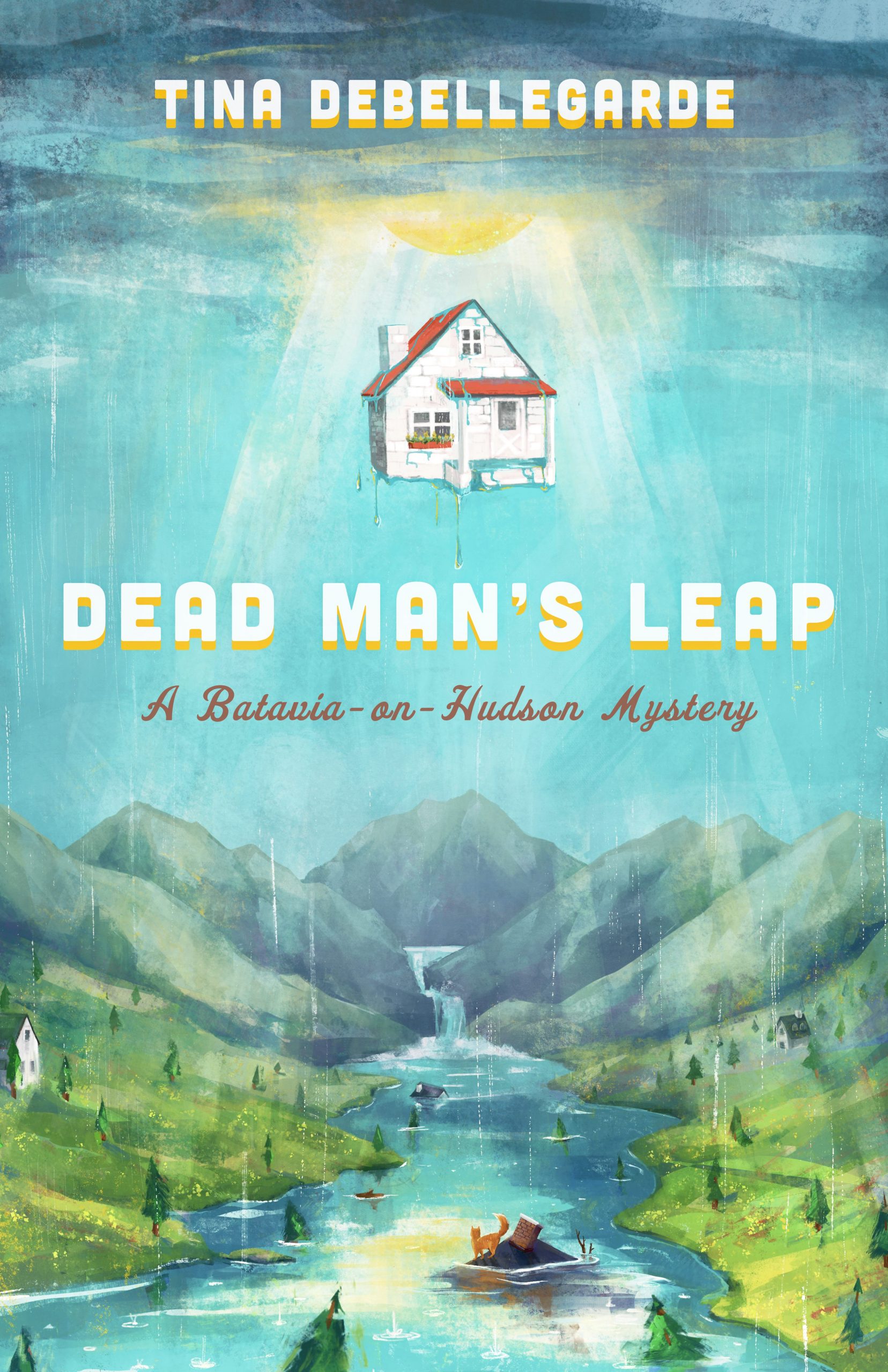
DEAD MAN’S LEAP revisits Bianca St. Denis in Batavia-on-Hudson, New York
Rushing waters…dead bodies…secrets…
As Bianca St. Denis and her neighbors scour their attics for donations to the charity rummage sale, they unearth secrets as well as prized possessions. Leonard Marshall’s historic inn hosts the sale each year, but it is his basement that houses the key to his past. When an enigmatic antiques dealer arrives in town, he upends Leonard’s carefully reconstructed life with an impossible choice that harkens back to the past.
Meanwhile, when a storm forces the villagers of Batavia-on-Hudson to seek shelter, the river rises and so do tempers. Close quarters fuel simmering disputes, and Sheriff Mike Riley has his work cut out for him. When the floods wash up a corpse, Bianca once again finds herself teaming up with Sheriff Riley to solve a mystery. Are they investigating an accidental drowning or something more nefarious?
Dead Man’s Leap explores the burden of secrets, the relief of renunciation, and the danger of believing we can outpace our past.
Book Details:
Genre: Traditional Mystery
Published by: Level Best Books
Publication Date: April 5, 2022
Number of Pages: 254
ISBN: 1685120849 (ISBN-13: 978-1685120849)
Series: A Batavia-on-Hudson Mystery, #2
Purchase Links: Amazon
ISLAND BREEZES
Jumping off Dead Man’s Leap was a rite of passage at the end of the school year. Olivia was never brave enough to make that leap.
Not until she beat the scourge of cancer and decided to challenge herself. I keep going back to her Last Page essay. That essay should challenge all of us.
A planned charity auction brings out secrets as well as donations. The secrets of the small village continue to surface as the entire community ends up sheltered in the same place during a heavy storm.
Human bones and a corpse washing up manage to drag out even more secrets.
In the midst of it all people are really getting on each others nerves while Bianca and Sheriff Mike try to figure everything out.
Thank you, Ms deBellegarde, for Batavia-on-Hudson mysteries. I’ll be looking forward to your next one.
***Book provided without charge by PICT,***
Read an excerpt:
CHAPTER ONE
He inched toward the precipice, his toes gripping the stone ledge as if they had a will of their own. He lifted his head and squinted into the sunlight still streaming through the blackening clouds. He took in the expanse of rushing water below. In all his eighteen years, Trevor had never seen the creek roil so ferociously.
A clap of thunder startled him. His toes relaxed, and he felt as if the slightest wind could take him over the edge. Lightheaded for a second, he regained his footing and his purpose.
He had no choice if he wanted all this to stop.
He needed to do it.
And do it now.
The downpour would break again soon. But for now, all he could hear was the rushing of Horseshoe Falls beneath him, the roar drowning out the noise of his past.
Of his father.
Of his mother.
Yes, his mother. He had expected his father to be weak, and wasn’t surprised at all after he left. But his mother? A mother’s love is supposed to be unconditional. At least that’s what she had always said before she had turned their world upside down. It was bad enough when she had played at being the sexiest woman in town. At least when his friends teased him then, it was meant to be fun. But this was worse, far worse. Now they wanted nothing to do with him. Now they used him as a punching bag.
His gang no longer looked to him as their leader. They ridiculed him for what his mother had done. From the beginning, he knew those kids were bad news. What choice did he have? In grade school he’d been bullied. Well, he had put a stop to that in high school. Can’t be bullied if you’re the biggest bully.
His mother was gone. His father was gone. And now his posse. First, it was the cold shoulder, and a few snide remarks. Then he was cornered in the locker room after the game one day. That was the hardest. He hadn’t taken a beating like that since the fifth grade. But the tables had been turned on him so fast that he never saw it coming. Trevor realized now that they were never friends. They were just a group of trouble makers who hung out together. Good riddance to them. He didn’t need them anymore.
Another thunderclap reminded him where he was. On the edge. Right on the edge. He either had to do this properly or he would be going over anyway.
Trevor looked over his shoulder one last time and heard a faint commotion in the background. Once they rounded the path, he closed his eyes and jumped.
* * *
Bianca St. Denis stretched to grab the cord just out of reach above her head and yanked on it with all her force to bring down the attic staircase. She tilted her head to avoid being struck as it made its way down. She unfolded the retractable stairs and put one foot on the first rung. But there she stopped, not sure she could take the next few steps. At forty-two the issue wasn’t her physical ability to climb the steps, she was active, even fairly athletic. The old saying went “the mind was willing but the body was not.” Well, in her case “the body was willing but the mind was not.”
She had stayed out of the attic all these months since Richard’s death. She had made do without her ski parka this past winter, and used Richard’s barn jacket she’d found in the mudroom instead. She had made do without the spring curtains she would normally switch out in the living room each March. The winter ones still hung heavy and foreboding. And she made do without the patio cushions she had sewn two seasons ago. She simply sat on the raw wood when she wanted to read or eat in the backyard. She hadn’t realized the number of things she had been doing without by avoiding the attic, not until the town started buzzing about the rummage sale. She pretended it was because she hadn’t had time to search for the items, but she knew better.
She took her foot off the rung, bent and picked up the stairs again, refolded them, and let them float to the ceiling. The hatch closed with a neat click.
* * *
Once Trevor hit the water, his tension disappeared. He welcomed the release and let himself drop. Slowly he was pulled down into the chaos of the rushing water, but his mind had floated above it all. He didn’t feel a thing, he observed it instead. He watched as his body sank, as it swirled in the vortex of the overfull creek. He watched as his body escaped the current and floated peacefully in the murky water. And he watched as he gave in to full renunciation and allowed the water to decide what was to become of him.
His thoughts slowed, as muddy as the water surrounding him.
They slowed, but he could not make them disappear.
He had managed to avoid jumping off Dead Man’s Leap every summer, but this year he knew he couldn’t get away with it. They had already threatened to make sure he jumped this year. That was only part of what the summer had in store for him. Who could he turn to? His grandparents had no idea what he was going through. They always hid their heads in the sand anyway. There was nothing they could do for him. So, he had taken matters into his own hands.
He was shocked when his head broke the surface, and despite himself he gasped for air in enormous mouthfuls until he gagged. He bobbed there, undecided, until he finally attempted the few strides to reach the cove. It took him longer than he expected, like swimming in molasses. A cross between his fatigue, his indifference, and the strong current kept him from reaching the bank in the three strokes it would normally require. On his knees, he crawled out of the pull of rushing water and dropped on the shore.
* * *
Leonard Marshall picked up the package, the paper crinkling in his hand. He carefully unwrapped one layer, then another. Layer after layer until he held the smooth tiny statuette in his hand. He trembled, and smiled, attracted and repulsed at the same time. How could such a tiny thing hold so many emotions for him? So much power over him? It was so small he could cradle it in the palm of his hand. He closed his fingers around it. It disappeared. He opened them again, and there it was. With it came a flood of memories. Exhilarating. His heart raced with a quick pat, pat, pat.
The basement door creaked. He took in a breath.
Time slowed and his heart with it.
Thump……thump……thump.
The light clicked on.
Another creak. Above him a step, a pause, another step. The door ached on its hinges as it opened wider. The light flicked off. The door closed. The steps faded. He let out his breath.
* * *
Trevor had never experienced fatigue like this. He crawled onto shore in the shadow of the cliff and collapsed. He never expected to make it out of the water, and now that he had, he lay there drawing in large mouthfuls of air, as if his lungs would never get enough. He stayed there, staring up at the sky, watching the dark clouds shapeshift. The rain would be there any moment, and to his surprise, he welcomed it.
As his breathing relaxed, he realized that the pain he felt was a sharp object stabbing his back. He rolled over, removed it, and threw it off to the side. As he turned to lay back down, his blurry eyes focused on the object. It was a bone. A human bone? He scrambled onto his knees and slowly made his way over to it. He was repulsed and fascinated, but mostly he was frightened by the sight of a bone and what that could mean. What had happened here, right here in this cove?
In the distance, he heard their drunken voices again. He knelt and grabbed handfuls of dirt to cover the bone. He heard them approach the edge of the cliff.
“He came this way. I saw him jump.”
“He’s too chicken, he didn’t jump. But when I find him, he’ll jump alright. He’ll jump or I’ll send him flying.”
“He jumped, I tell ya. Leave him alone. You wanted him to jump, and he did. I saw him. Let it go, already.”
“Yeah, well if he jumped, where is he?”
“You think he’s still under? You think he hit his head like that kid a while back?”
“I’m telling you, he didn’t jump.”
“There’s nowhere else to go but down. Of course, he jumped.”
“I’m going in. If he did jump, we’ll find him down there. He’s probably hiding under the cliff.”
Trevor carefully picked his way out of the cove. Scraping up against the cliff as close as his body would allow, he followed the contours until he came out on the other side of the falls. With his last bit of strength, he climbed up the rocky trail alongside Horseshoe Falls.
***
Excerpt from Dead Man’s Leap by Tina deBellegarde. Copyright 2022 by Tina deBellegarde. Reproduced with permission from Tina deBellegarde. All rights reserved.
Author Bio:

Tina deBellegarde has been called “the Louise Penny of the Catskills.” Winter Witness, the first book in her Batavia-on-Hudson Mystery series, was nominated for an Agatha Award for Best First Novel, a Silver Falchion Award and a Chanticleer Mystery and Mayhem Award. Her story “Tokyo Stranger” which appears in the Mystery Writers of America anthology When a Stranger Comes to Town edited by Michael Koryta has been nominated for a Derringer Award. Tina’s short fiction also appears in The Best New England Crime Stories anthologies. She is the vice-president of the Upper Hudson Chapter of Sisters in Crime, a member of Mystery Writers of America and Writers in Kyoto. She lives in Catskill, New York, with her husband Denis and their cat Shelby where they tend to their beehives, harvest shiitake mushrooms, and cultivate their vegetable garden. She winters in Florida and travels to Japan regularly to visit her son Alessandro.
Catch Up With Tina deBellegarde:
tinadebellegarde.com
Goodreads
BookBub – @tinadebellegarde
Instagram – @tdb_writes
Twitter – @tdbwrites
Facebook – @tinadebellegardeauthor
Tour Participants:
Visit these other great hosts on this tour for more great reviews, interviews, guest posts, and giveaways!
Enter to Win:
This is a giveaway hosted by Partners in Crime Tours for Dead Man’s Leap by Tina deBellegarde. See the widget for entry terms and conditions. Void where prohibited.
Get More Great Reads at Partners In Crime Tours
The Light of the World
May 7th, 2022In the Middle
May 3rd, 2022In the Middle
by Carin Fahr Shulusky
May 3, 2022 Book Blast
Synopsis:

Book Details
Genre: Fictional Memoir
Published by: Fossil Creek Press
Publication Date: January 18, 2021
Number of Pages: 198
ISBN: ‘9781736241707
Purchase Your Copy Today: Amazon, Barnes & Noble, Goodreads
Read an excerpt:
Each organ of Mom’s body had its own doctor: cardiologist, neurologist, urologist, gynecologist, optometrist, dermatologist, podiatrist, and dentist. Everything was failing and in need of repair. I actually think we could take Mom to a different doctor every day of the week. As it was, we managed the most urgent needs and hoped for the best with the rest. Maria took Mom to the cardiologist, who was managing her medications and needed to take regular blood levels. I took Mom to the urologist because she was having urinary tract troubles, possibly caused by the medications prescribed by the cardiologist. John took Mom to the physical therapist, who could also no longer make home visits on insurance. Physical therapy was prescribed by the cardiologist to help her get more mobile.
Each trip out required us to call her multiple times to remind her of the appointment, then we had to arrive nearly an hour early because she would invariably not be ready. Getting Mom ready for a doctor visit required finding clean clothes, inserting hearing aids, and getting her false teeth in place—and making sure she made a bathroom visit. Before leaving we would have to locate her insurance card, her checkbook, her purse, scarf, and coat.
I’d pull my car up to her front porch through the lawn so Mom would have the least number of steps from house to car. Getting into the car was difficult to the extreme. Once I had Mom in the car, I’d load her walker and cane in the trunk.
When we got to the doctor, we would have to reverse the process: get the walker out of the trunk and Mom in the door and find a place for her to sit while I parked the car. I’d run back in before Mom decided to try to find her own way up the elevator to the doctor’s office or some thoughtful person decided to help and I’d lose her.
I thought it would be easier when we were finally in the doctor’s office until the nurse said she’d need a urine sample and handed Mom a cup. The idea of this eighty-two-year-old lady, who could hardly use the toilet herself and missed it most of the time, managing to actually get urine in a cup was so ludicrous I just burst out laughing. The nurse was not amused. She gave me an incriminating look, put the cup back and held up a “hat” that fit over the whole toilet seat. Still chuckling despite my best efforts to stop, I shook my head in agreement and lead Mom to the bathroom. The rest of the visit went fairly normal.
Before I could go in with my mom, the nurse had to ask her if it was okay that this person—me—could come into the exam room. Mom looked puzzled. The nurse muttered something about privacy laws and we went in. No one noticed that I was holding my breath. I was terrified that Mom would say no.
No one knew what would come out of her mouth next. If I didn’t go in, the doctor would surely get incorrect information and whatever the doctor told Mom would be lost. She could hardly remember having a doctor visit, much less what he said. But I couldn’t argue the point. What was I supposed to say? Hey guys, she’s half crazy. Why are you asking her? Not only would that get me nowhere, it would hurt Mom’s feelings. Whoever proposed the privacy laws surely doesn’t have aging parents. Fortunately, she said yes, so I could enter.
The doctor discussed why she was having frequent urinary tract infections, which I’m sure went right over her head. Then he said, “We should see you back next month.”
I want to shout, No, please no, but I said, “Is it necessary? I have to take a day off work to get her here,” I pleaded.
Mom caught that too well and said, “I’m sure Maria will be glad to bring me.”
Now, the thing I was trying so hard to avoid was out. I made a great effort to hide from Mom my frustration and anxiety over losing a day’s work. I didn’t want her to think my work was more important than her. I didn’t want to think that either, but there it was, always under the surface, in the deep dark places of my ambition.
I had taken a half day off, left at noon, and didn’t plan to return to work. My boss would never understand this.
Shopping with Mom on the Internet didn’t work out too well. Visualizing an item in one dimension just wasn’t working for her, so I thought we would try the old fashion way. I knew Mom wanted to go to Penney’s so I thought we would start there. I told Mom the mall had wheelchairs we could borrow, but she was so negative on that idea that I quickly let it drop. Even with Mom’s handicap parking pass, we couldn’t get close enough to the store, so I pulled right in front, got the walker from my trunk, and helped her in the store. It would have worked well if the store had any place to sit, but there was nothing.
I told Mom to go on in the store and I’d catch up with her. By the time I had parked and caught up, she had already found two items she wanted: one for Maria and one for Katie. She next wanted to buy John a pair of shoes, so I helped her to the shoe department and she quickly found a pair of work shoes that she wanted. I made sure we had all the receipts tucked neatly in her purse. She wanted to find a new blouse for Christmas, so we made our way to an elevator and up to the next floor. She walked a small way and suddenly stopped.
“I don’t think I can go any further,” Mom said. “I’m just worn out.”
I knew this was a stretch, but I was hopeful. I asked the sales lady if there were any chairs in the store. To my surprise, she found a folding chair from the storeroom and brought it out for Mom. While Mom rested comfortably—more or less—in the chair, I brought her several styles and colors of shirts. She picked one and I purchased it for her.
“We could go to another store if you would let me get a wheelchair,” I offered.
“No,” she said firmly. “It’s not time for a wheelchair yet. I’ll get Maria to take me another day. I think I need to go home.”
On the way home, we passed our favorite soft-serve ice cream store.
“How about an ice cream cone?” I asked.
“That sounds lovely,” Mom said. We could always agree on ice cream. We had a wonderful time eating our ice cream. I suppose I inherited my passion for the stuff from Mom. With the happy ice-cream high, we parted cheerfully. I carried all her purchases to her bedroom as directed and promised to return to help with Christmas decoration.
—
Excerpt from In the Middle by Carin Fahr Shulusky. Copyright 2021 by Carin Fahr Shulusky. Reproduced with permission from Carin Fahr Shulusky. All rights reserved.
Author Bio:

Carin Fahr Shulusky was born and raised in west St. Louis County. She attended the University of Missouri, Columbia, where she received a B.J (Bachelor of Journalism). After college she worked in advertising for GE and Monsanto. She was the first professional woman in her division of each. After 25 years in Marketing, she created her own firm, Marketing Alliance. She was president of Marketing Alliance, from 2002 – 2014. She is a past-president of the Business Marketing Association of St. Louis. Carin Fahr is married to Richard Shulusky. They have two grown children and one marvelous granddaughter. Grandma Carin has a life long love of cooking, even writing her own cookbook. In 2014 Carin retired to devote full time to writing. Her first book, In the Middle was inspired by her own battle to care for her beloved mother, Dorothy Fahr. Many of the stories Carrie Young’s mother tells her in In the Middle came from Carin’s mother. Carin is a lifelong member of, Pathfinder Church in Ellisville, Missouri, where she volunteers in early childhood.
Find Carin Online:
carinshulusky.com
Goodreads
Instagram – @cshulusky
Twitter – @shulusky
Facebook
Tour Host Participants:
Visit these other great hosts on this tour and learn more!
| 6. |
| 9. |
| 10. |
| 11. |
| 12. |
| 13. |
ENTER FOR A CHANCE TO WIN
This is a giveaway hosted by Providence Book Promotions for Carin Fahr Shulusky. See the widget for entry terms and conditions. Void where prohibited.
Thank you for your interest in this tour!
Find Your Next Great Read at Providence Book Promotions!
This is a giveaway hosted by Providence Book Promotions for Carin Fahr Shulusky. See the widget for entry terms and conditions. Void where prohibited.
Thank you for your interest in this tour!
Find Your Next Great Read at Providence Book Promotions!
Murder, Sweet Murder
May 3rd, 2022Murder, Sweet Murder
by Eleanor Kuhns
April 11 – May 6, 2022 Virtual Book Tour
Synopsis:
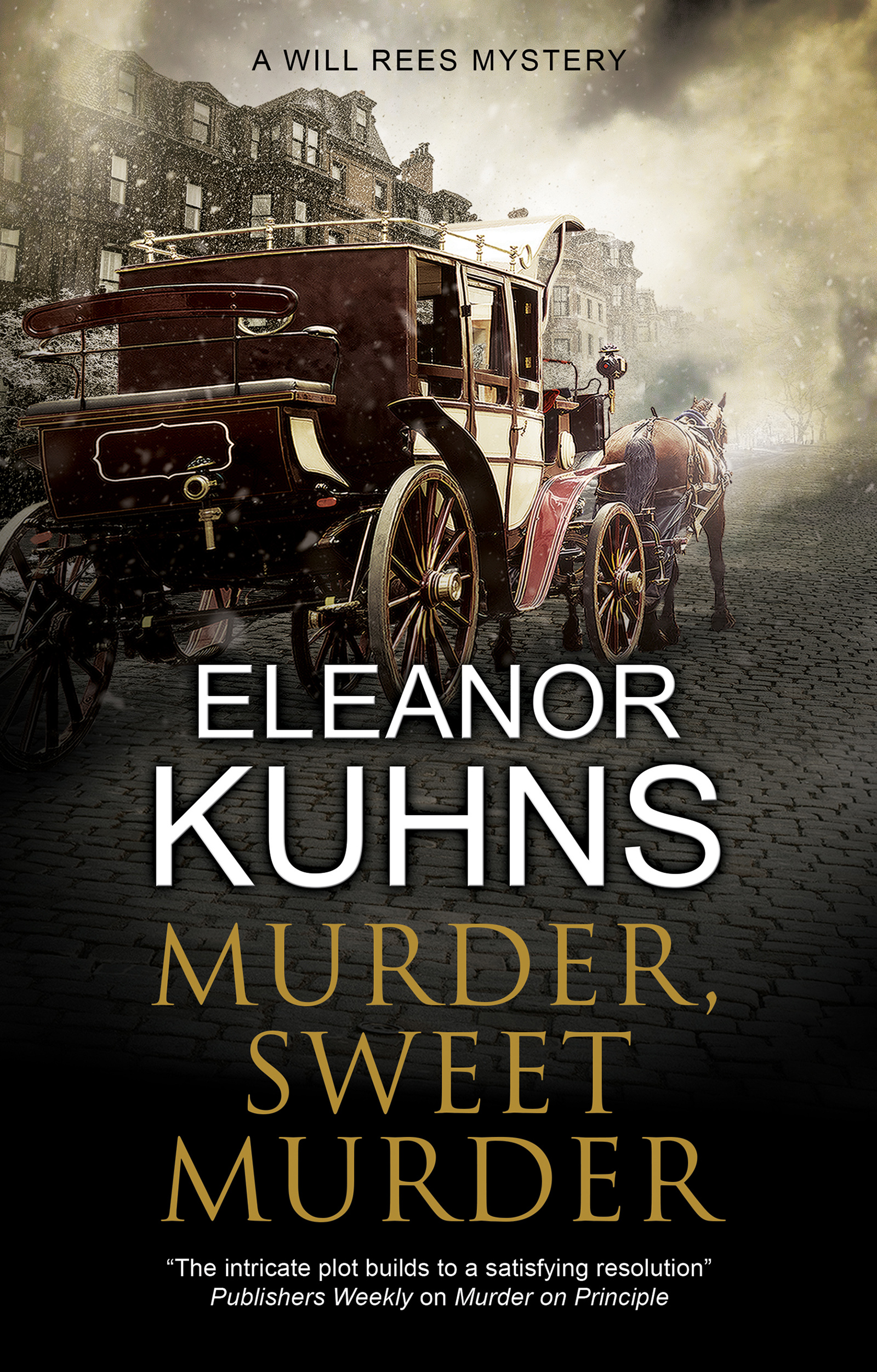
Will Rees accompanies his wife to Boston to help clear her estranged father’s name in this gripping mystery set in the early nineteenth century.
January, 1801. When Lydia’s estranged father is accused of murder, Will Rees escorts her to Boston to uncover the truth. Marcus Farrell is believed to have murdered one of his workers, a boy from Jamaica where he owns a plantation. Marcus swears he’s innocent. However, a scandal has been aroused by his refusal to answer questions and accusations he bribed officials.
As Will and Lydia investigate, Marcus’s brother, Julian, is shot and killed. This time, all fingers point towards James Farrell, Lydia’s brother. Is someone targeting the family? Were the family quarreling over the family businesses and someone lashed out? What’s Marcus hiding and why won’t he accept help?
With the Farrell family falling apart and their reputation in tatters, Will and Lydia must solve the murders soon. But will they succeed before the murderer strikes again?
Book Details:
Genre: Historical Mystery
Published by: Severn House Publishers
Publication Date: February 1st 2022
Number of Pages: 224
ISBN: 0727850091 (ISBN-13: 9780727850096)
Series: Will Rees Mysteries #11
Purchase Links: Amazon | Barnes & Noble | Goodreads
ISLAND BREEZES
Will and Lydia Rees find themselves in Boston trying to prove her father innocent of murder. But is he?
Murders keep happening but there’s too many suspects who want these people dead.
This book kept me guessing until the surprise ending. Just like it kept Will and Lydia guessing until the end.
I have really enjoyed all the Will Rees Mysteries that I have had the pleasure to read. You can check them out here and here.
Thank you, Ms Kuhns. I’m looking forward to more Will and Lydia Rees adventures.
***Book received without charge from PICT.***
Read an excerpt:
After regarding Rees for several seconds, Mr Farrell extended his hand. Rees grasped it, painfully conscious of his rough hand, calloused by both farm work and weaving. ‘Please attend me in my office,’ Mr Farrell said. ‘We are expecting a few guests for dinner tonight so we will have little time to talk then.’ Turning, he strode away. Rees started to follow but, realizing that Lydia was not by his side, he turned back. She stood hesitantly by the table, her hands tightly clenched together. Rees glared at Mr Farrell’s back and then, reaching out, he pulled one of her hands through his elbow. Together they followed her father into his office.
As Farrell moved a stack of papers from the center of the desk to one side, Rees looked around. A large globe on a stand stood to the right of Farrell’s desk and one chair had been drawn up to the front. A seating area, with additional chairs, were arranged by the window that looked out upon the front garden. A table in the center held an intricately carved tray with a crystal decanter and several glasses. Shelves of books lined the wall behind and adjacent to the desk, on Rees’s right.
The room was chilly although the fire was burning. Newly laid, it had been lighted, no doubt by some anonymous servant.
Farrell looked up and his eyes rested on Lydia in surprise. Rees felt his wife shrink back, intimidated. He was not going to stand for that. He pulled a chair from the window grouping and placed it in front of the desk. She hesitated for a few seconds and then, lifting her chin defiantly, she sat down. Once she was seated, Rees lowered himself into the opposite chair. After one final dismissive glance at his daughter, Farrell looked at Rees.
‘So, you are a weaver.’
‘That is so,’ Rees said, adding politely, ‘I understand you are a merchant.’
Farrell smiled. ‘I see your wife has told you very little about me or my profession.’ Since responding in the affirmative seemed somehow disloyal to Lydia, Rees said nothing.
Farrell took a box from his desk drawer and opened it to extract a cigar. ‘Would you like a smoke?’
‘No thank you,’ Rees said.
‘Or a glass of rum? Or whiskey if that is your tipple.’ When Rees declined again, Farrell put away the cigars and walked to the fireplace to light a splint. The end of the cigar glowed red and the acrid scent of burning tobacco filled the room. Puffing, Farrell returned to his seat. ‘I suppose one could say I was a merchant. But I do so much more. I own a plantation as well as a fleet of ships that sail between Boston, the West Indies and Africa. In Jamaica they take on sugar and molasses which are returned to Boston. Some of it is transformed into rum in my distillery. I export the liquor overseas, both to England and to Africa where the proceeds are used to purchase slaves.’
Sick to his stomach, Rees glanced at Lydia. She was staring at her hands, her face flaming with shame. Although she had alluded to her father’s profession, she had not told him the half of it. She had not told him of her father’s pride in it. Rees understood why she hadn’t.
‘Most of the slaves are brought to the sugar plantation,’ Farrell continued, seemingly oblivious to his daughter’s distress, ‘but some are sold in the Southern states. And you needn’t look so shocked. Why that upstart Republican with his radical ideas, Mr Jefferson, owns slaves. And he may be the next President. I suppose you voted for him.’
Rees did not respond immediately. Although many of Mr Jefferson’s ideas were appealing, Rees had found in the end that he could not vote for a slave holder. Instead, he had voted for Mr Adams. But that gentleman had not placed; the election was a tie between Thomas Jefferson and Aaron Burr. Sent to the House for resolution, Jefferson had won by one vote.’ No,’ Rees said carefully, keeping his voice level with an effort, ‘I voted for his opponent.’
‘Well, that makes us kin then. Although you will meet a few slaves here in Boston, in this very house.’ He grinned and Rees thought of Morris and Bridget with their tinted skin. ‘But few, very few. Neither the Africans nor the Spanish Indians adapt well to this northern climate and they quickly die.’ This was said with indifference as though he spoke of a broken chair.
Farrell flicked a glance at his daughter and smiled. With a surge of anger, Rees realized that Farrell fully understood the effect his speech would have on her and was enjoying her misery. Rees gathered himself to rise from his chair. Lydia reached out and grasped his sleeve.
‘This is for Cordy,’ she whispered. Rees sat down again, his body stiff.
‘But you did not come to listen to me natter on about my profession,’ Farrell said, watching the byplay with interest. ‘Shall we discuss that ridiculous murder, the one of which I am accused?’
Rees looked into Lydia’s beseeching eyes and after a few seconds he relaxed into his seat. God forgive him, a part of him hoped Marcus Farrell was guilty.
‘Go on,’ Rees said coldly. Marcus smiled.
‘Permit me to save you both time and effort,’ he said. ‘I did not kill that boy.’
‘Then why do people think you did?’ Rees asked. Puffing furiously, and clearly unwilling to reply, Farrell took a turn around the room.
‘Did you know him?’ Lydia asked, her voice low and clear. ‘This Roark?’
Farrell stood up so abruptly his chair almost tipped over. ‘Yes, I knew him.’ He glanced at Rees. ‘We were seen, Roark and I, arguing down at Long Wharf.’
‘Arguing about what?’ Rees asked.
‘It is not important. He was a nobody.’ Farrell glared at Rees, daring him to persist. Rees waited, never removing his gaze from the other man. Sometimes silence made the best hammer. Finally, Farrell said angrily, ‘He wanted a rise in his wages. I said no. He disagreed. That was all there was to it.’
Rees glanced at Lydia and found her staring at him. He knew, and he suspected she did too, that her father had just lied to them.
***
Excerpt from Murder, Sweet Murder by Eleanor Kuhns. Copyright 2021 by Eleanor Kuhns. Reproduced with permission from Eleanor Kuhns. All rights reserved.
Author Bio:

Eleanor Kuhns is the 2011 winner of the Mystery Writers of America/Minotaur first mystery novel. Murder, Sweet Murder is the eleventh mystery following the adventures of Rees and his wife. She transitioned to full time writing last year after a successful career spent in library service. Eleanor lives in upstate New York with her husband and dog.
Catch Up With Eleanor Kuhns:
www.Eleanor-Kuhns.com
Goodreads
BookBub
Twitter – @EleanorKuhns
Facebook – @writerkuhns
We’re also having an insta-party! Visit Instagram – #eleanorkuhns to join us!
Tour Participants:
Visit these other great hosts on this tour for more great reviews, interviews, guest posts, and giveaways!
Join In and You Could WIN!
This is a giveaway hosted by Partners in Crime Tours for Eleanor Kuhns. See the widget for entry terms and conditions. Void where prohibited.

